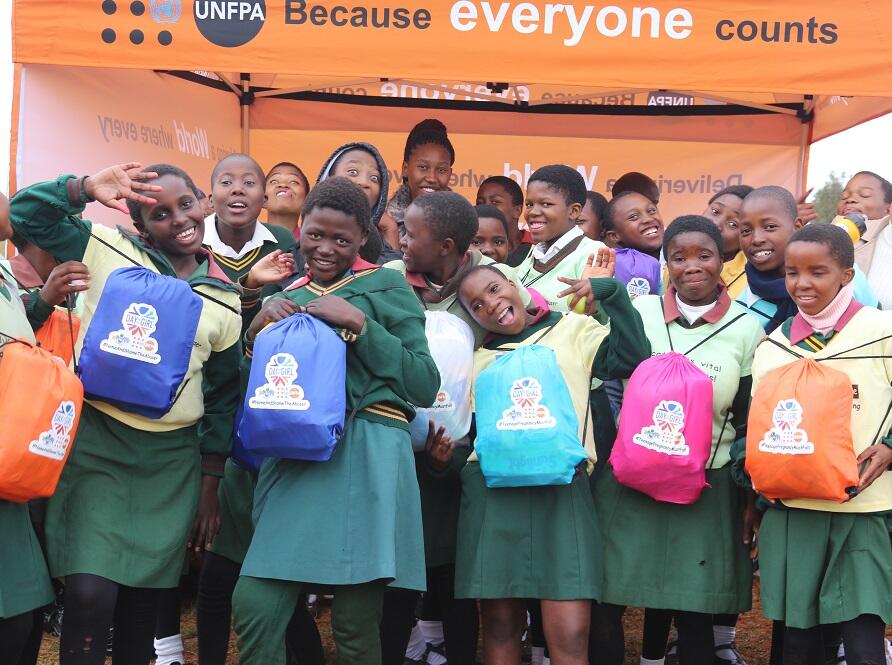MBABANE, Swaziland – in an effort to mitigate the negative impact of the drought on adolescent girls, in 2016 UNFPA distributed 1,602 dignity kits to the most vulnerable adolescent girls in the Lubombo and Shiselweni regions, two of the regions hardest hit by the El Nino induced drought. The contents of the dignity kits comprised of basic hygiene items like bath soap, toothpaste, tooth brush wash soap, wash towels, toilet paper, deodorant, Vaseline, body lotion and a 3 months’ supply of sanitary pads – all in a versatile toiletry bag that can be used for other purposes.
The dignity kits were distributed during ongoing national food distribution to drought affected communities, and was coordinated through a partnership with the National Disaster Management Agency (NDMA), World Food Programme (WFP), and WFP’s community-based implementing partners, including World Vision Swaziland, Save the Children, African Cooperative Action Trust (ACAT) and Caritas Catholic Relief Agency. Community rural health volunteers and teachers at community schools played an important role in identifying and developing lists of adolescent girls most in need, because of their in-depth knowledge of communities to the household level.
Interviews with some of the adolescent girls revealed some have had to drop out of school because of constrained family resources to take care of their school needs (e.g. uniform, shoes and fees). Most also mentioned that because of drought stresses on family income, some of the first things to go off the household monthly lists are their personal hygiene care items, e.g. sanitary pads. A 15 year old adolescent girl from Hlutse community in the Lubombo region, when she received the UNFPA dignity kit mentioned that she was very happy with all the contents, but more so with the 3 months’ supply of sanitary pads, noting that this will assist improve her personal hygiene during her menstrual period.
Joy and excitement was evident on the faces of the 153 girls who received the dignity kits at Bekezela Primary School, a school in the Lubombo region. Asked which items they found most useful, most noted that whilst it was not easy to single out one item, the sanitary pads will be most useful for them. When interviewed, one of the teachers at the school observed that she had seen a number of girls absent from school during their menstrual time. She said she knew for sure that these dignity kits would improve the school attendance of adolescent girls for the next three months.
I know for sure that the supply of sanitory pads will improve the school attendance of the adoslcent for the next three months - teacher, Bekezela Primary School
Both dignity recipients and community members expressed that the distribution of the dignity kits was very pertinent, and recommended that the provision of sanitary pads be fully integrated as part of the drought response, for both in-school and out of school adolescents. Teachers, who experience first-hand the positive effect of these on school attendance by adolescent girls, expressed similar sentiments.
The procurement and distribution of the dignity kits was made possible through support from the UNFPA Humanitarian and Fragile Context Branch, as part of a broader intervention to strengthen the reproductive health and protection components of the national drought response. The intervention had 3 objectives, namely 1/ to strengthen the capacity of health institutions to deliver lifesaving maternal and newborn health care services during the current drought situation; 2/ to strengthen the capacity of schools and community structures to mitigate the negative effects of drought on the reproductive health of adolescent girls and visibly pregnant women in drought affected areas; and 3/to increase the capacity of health facilities and referral centers to effectively address and manage sexual and gender-based violence and increase awareness and sensitization on GBV at health facility and community levels.


